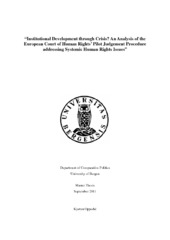Institutional development through crisis? an analysis of the European Court of Human Rights' pilot judgement procedure addressing systemic human rights issues
Master thesis
Permanent lenke
https://hdl.handle.net/1956/5352Utgivelsesdato
2011-09-20Metadata
Vis full innførselSamlinger
Sammendrag
The thesis aims to investigate a new approach put to use by the European Court of Human Rights for the first time in 2004, known as the Pilot Judgement Procedure, and asks whether this procedure contributes to the constitutionalisation of the human rights protection under the Court's jurisdiction. It is widely claimed that the European Convention system has become a victim to its own success". After enlargements and Protocol No. 11, which made acceptance of the individual right to petition the Court mandatory on all Contracting States, the Court has seen a rise in application figures with which it has been unable to deal efficiently. The majority of applications are repetitive applications that originate in a structural problem in the given state, and in which precedent has already been established in the Court's case-law. The Pilot Judgement Procedure seeks to deal more efficiently with these cases by addressing the structural problem in which the applications originated. The thesis assembles a theoretical framework of constitutional dimensions, encapsulating how the process of constitutionalisation may proceed. Constitutionalism entails that certain domains are fenced off from majoritarian control and given protection as higher-order norms, but the extent and scope may vary. Thus, constitutionalisation is conceptualised as the process of institutionalising higher-order norms, with which lower-order norms must conform. Furthermore, the special nature of legal systems' authority, their inherent powers to decide on their jurisdiction, and their lack of hard enforcement mechanisms may drive and obstruct constitutionalisation respectively. In form of an explorative case study thirteen judgements of the new approach are analysed and contrasted to the Court's traditional approach. The thesis finds that whereas the judgements of the European Court of Human Rights have traditionally only had individual redress, by ordering the states to give monetary compensation on individual basis for human rights violations, the Court now orders the states, in the formal binding part, to ensure that their domestic practices are in conformity with the principles of the Convention and the Court's case-law. In doing that, the Court has on several occasions ordered the states to bring concrete legislation into conformity with these principles, or has ordered the states to set up effective domestic remedies, in order to reach compliance with the Convention and the standards established in the Court's case-law, thus to a greater extent establishing these norms as higher-order norms. The findings indicate that this development has mainly been court-driven". Due to the recentness of the phenomenon, the thesis can only indicate the procedure's effectiveness based on the first docket of judgements. Thus, this aspect needs to be more systematically investigated as the number of judgements increases.
Utgiver
The University of BergenBeslektede innførsler
Viser innførsler beslektet ved tittel, forfatter og emneord.
-
Informal Settlements and the Human Right to Property - The international legal protection of the human right to property, for inhabitants of informal settlements
Povoa, Birte Sofi Thomassen (Master thesis, 2017-07-06) -
Challenges in applying human rights law to armed conflict : the relationship between international human rights law and international humanitarian law
Holgernes, Tord Honne (Master thesis, 2009-06-02) -
Recognized but not Protected? The Human Right to Safe Drinking Water & Protection of Foreign Investments in Water Utilities. Regulatory restrictions and duties in international investment law and a case study of three investor-Argentina disputes (ICSID)on the gap between recognition and enforcement of the human right to water.
Ekblom, Sara Myklestad (Master thesis, 2018-07-07)
